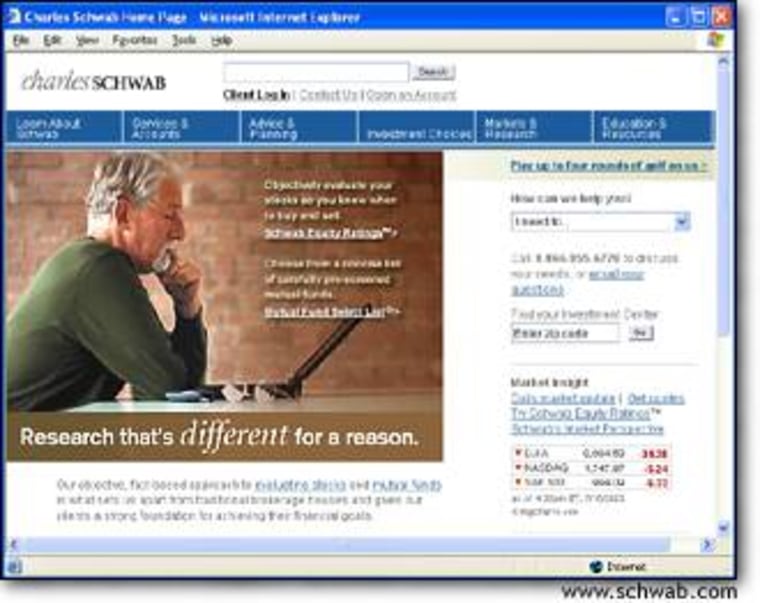As online brokers like E*Trade and Charles Schwab report earnings this week and next, Wall Street will be looking for signs that the individual investor, the lifeblood of these firms, is returning to stocks. A rising market has certainly fueled investor interest in equities, with online brokers reporting large trading volume growth in recent months, but analysts say it’s too early to say online trading is once again back in fashion.
Three consecutive years of declining stock prices haven’t been kind to the online brokerage business. Individual traders were happy to buy and sell stocks on their PCs with little professional assistance during the late 1990s stock rally, but they turned and ran for the exits as the bubble burst, sending trading activity down nearly 60 percent from its peak in early 2000.
Now, three years on, smaller investors appear to be tiptoeing back into the stock market, and online brokers like E*Trade and Charles Schwab are likely to be direct beneficiaries.
Lured by soaring stock prices, a modest brightening of the economic picture and an upbeat first-quarter earnings season, trading volume growth at online brokerages has jumped over the last couple months. The enthusiasm helped to drive the Standard & Poor’s 500-stock index, a broad market measure, up 15 percent in the second quarter.
“Over the last several months there has been a pickup in online trading activity by retail clients,” said Richard Peterson, a stock market analyst for Thomson/First Call. “Some of is has been by speculative, short-term day traders. But when the market is going up 100 points every day it tends to draw in some of the investors who are on the sidelines.”
Daily trading volume surges
At online broker Ameritrade, average daily trading volume in May was over 25 percent above April’s levels. Charles Schwab recently reported total daily average trades rose 13 percent in May from April’s level. As a result, Merrill Lynch expects overall online trading activity in the second quarter to grow by up to 35 percent from the weak first quarter, when trading volumes were depressed by the specter of war with Iraq.
After Wednesday’s closing bell, E*Trade said it processed an average of 116,540 customer trades per day in the second quarter, up 41 percent from the prior three-month period. The online bank and brokerage company also said its second-quarter earnings fell, hurt by a hefty restructuring charge, but raised its full-year earnings forecast.
Expectations were high for E*Trade. The Menlo Park, Calif., firm’s share price has more than doubled so far this year and hit a 52-week high of $10.34 in Monday’s trading session. Shares of other online brokers are up sharply from their March 11 lows, including Ameritrade and Charles Schwab, which have seen their stock prices double.
A rising interest from individual investors may be one sign that the three-year bear market is over. Still, analysts caution that declaring the definitive return of the individual investor to their PCs may be premature.
Many of them are likely to dump their stocks if the economic outlook worsens, or if more corporate scandals rear their heads. And the summer is traditionally a slow period for trading, and so with the stock market already holding on to substantial gains there is some concern that the rally may soon peak.
As the market’s rally stumbled over the last month, so did trading volumes at online brokerages, according to Colin Clark, a brokerage analyst at Merrill Lynch. “We believe volumes likely slowed somewhat in the latter half of the month, based on broad market trends,” he wrote in a research note. Share volume on the Nasdaq market was 19 percent lower in the last two weeks of June compares with the first two weeks, Clark said.
The investment environment for online traders has changed too, noted Peterson at Thomson/First Call. “There are still probably investors out there who lost their shirts in the stock market downturn and who will never invest in the equity markets again. And those that do will probably not invest more than small portion of their capital in speculative issues.”
Another reason why the flickers of small-investor enthusiasm may not be sustainable is the fact the three years of declining stock prices have made investors more conservative, points out Brad Hintz, securities industry analyst at Sanford C. Bernstein. “They have lost confidence in their ability to buy individual stocks and are more willing to use mutual funds and fixed-income instruments,” said Hintz. “We’re not seeing more frequent, aggressive investors.”
No upturn seen until 2004
Hintz doesn’t expect the retail investor to return to the market with great vigor in 2003. “Looking at history, 2004 is the best bet,” Hintz said. “Typically, we find it takes retail investors twice as long as professional investors to get back into the market.”
In the meantime, a company like E*Trade can still benefit. The firm recently diversified its business, offerings loans, ATMs and checking accounts. “They are basically an online commercial bank,” said Hintz. “It was their saving grace during the downturn, because they were able to do mortgage loans at a time when stock trading was dwindling.”
Charles Schwab, which struggled during the market’s downturn, has aimed to distinguish itself from scandal-tainted full-service brokerages by touting its ability to deliver independent research. Richard Peterson, however, is not convinced the strategy will resonate with investors.
“It may be a selling point, but investors have been very skeptical about research in general, from wherever it comes, and so I think it will have a minimal impact,” Peterson said. “Investors [still] don’t hold research in high regard.”
Reuters contributed to this story.
